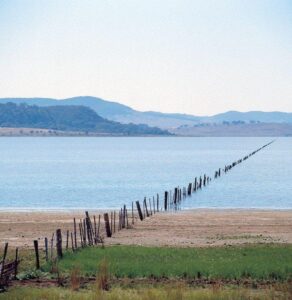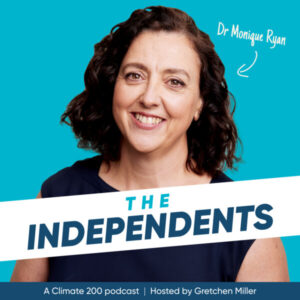It was a modest dilemma, but a dilemma nevertheless. We had stopped in Genoa, a small sliver of civilisation which had nearly been razed to the ground two years ago by the 2019-2020 bushfires which had burnt through the far east of Gippsland. It resembled a ghost town. The late autumn day was beautiful, and we noted that there was a new bridge over the river which flowed through the hamlet. So even though there seemed to be no one around, someone had spent money on the bridge.
We stopped in front of a very shabby building. The sign on the front of the building indicated that it was once a hotel/motel. It seemed to me to be disused; my wife disagreed. She thought there were people living there. There was no fence around the front of the motel.

However, in the front of the building was a tree loaded with lemons. There was only one windfall, and that was on the wrong side of ripe.
As we were contemplating a guy riding on a tractor rode up to the north wall of the motel, but did not stop. That was the only person we saw.
I looked at the lemons. They were many beautiful ripe yellow lemons.
I was tempted; my wife said no.
The dilemma: Would you pick lemons off the tree or not?
We were only 45 minutes by taxi from Eden. Could not see any apple tree though.
Wistful in Werriwa

My eye was caught by a small piece which said that Morrison was contemplating winning Whitlam’s old seat of Werriwa. He had descended on that electorate to start the day with a group of locals, or so it was reported. Now Werriwa is the Aboriginal name for Lake George, which mysteriously periodically fills up with water and then empties, with no river flowing in and out to explain its fluctuation. Werriwa was one of the original electorates at the time of Federation. As the population has grown, the electorate has moved closer to the southern outer suburbs of Sydney, and thus has been a stronghold of the Labor Party since 1934.
Morrison believed such a seat was winnable, as he cast himself as the Everyman battling the Political Elites. He was encouraged by a media machine that we have endured for a long time, particularly after the accession of Rudd, biased to the Coalition. Morrison was also buoyed by his surprise victory in 2019, with a major swing in Queensland. He made the assumption that he could cast himself as the champion of the working man. “Man” was the operative word. Werriwa has a woman member, and with a very “Anglo” name, Anne Stanley.
Added to that were migrant communities where you could sow the divisive wedge politics, particularly playing upon conservative religious practices. Here, sexuality and general relaxation of patriarchal family relationships, admixed with spurious declamation about religious freedoms, were perceived by Morrison and his advisers to be fertile ground for playing on prejudice to gain votes. The Liberal Party candidate was Sam Kayal, the surname Lebanese; and obviously he seems to be very friendly with the Mayor of Liverpool, who is also of Lebanese heritage, presumably Christian.
When you reviewed the first preferences in the recent Federal election, the Liberal Democrats, the One Nation Party and United Australia Party collected about 23 per cent of these. The Greens received a modest increase of just over one per cent to 6.6 per cent.
Both the major Parties in the allocation of first preferences lost ground – Labor lost eight per cent and the Liberals four per cent. After the allocation of preferences, the swing against the Labor Party had been reduced to 0.3 per cent. If the three right wing splinters had been solid for the Coalition, the seat would probably have fallen to the Liberals.
When I first read the piece about Morrison, I scoffed. Now it is food for thought; maybe it was a lockdown reaction, where each side received electoral contumely. Certainly, how the votes flow in the NSW election next year will be more interesting, because the antipathy to the enforced “lockdowns” should have faded by then.
Enter Dr Ryan
Let me say, as I have said before, that my health care has been very good, considering my co-morbidities. Yet I do not have one health professional who can provide all my ongoing care. Why? Because the world of medicine is so sub-specialised that having all the information in one place is impossible. As I have been a medical practitioner, I have navigated the system with varying degrees of success. This has meant that for probably six months my auto-immune disease was undiagnosed; but I knew when I was fibrillating and not reverting to sinus rhythm.
Take for instance, because of arthritic changes in both my cervical and lumbar spine, coupled with some symptomatology which suggested impairment of neural function, a spinal surgeon that he would operate. I found his clinical approach puzzling and consulted a colleague of mine – a neurologist – who said that, in his opinion, the operations were unnecessary. That was six years ago, and the disability caused by these changes has not progressed.
He retired but referred me to a neurologist in Sydney. The cost for the initial consultation was announced by the practice to be $800, more than three times the appropriate Medicare benefit. I would have thought that outrageous, especially so given that he would have my notes passed on by my previous neurologist who had settled for the Medicare benefit as full payment for a consultation.
Ironically, through the consultant physician professional association of which I was vice-president at the time, I had negotiated with the Commonwealth Health Department in 2006 to create the Medicare item which reflected recognition of significant complexity in consultations.
Let me say that the neurologist whom I consulted was understated, yet had an eye for detail; more importantly, he had wide clinical experience and a great modicum of common sense.
 Talking of neurology, Professor Monique Ryan, a prominent paediatric neurologist has been elected to the Federal Parliament. As a member of a small sub-specialty, her natural health constituency is one of the “elitist” areas of the profession – small patient load given there are about 120 paediatric neurologists; yet, irrespective of needs, the sub-specialities keep on expanding. There is also a tendency in these small specialties for the doctors to become researchers or even more sub-specialised. In a review of the field, 250 neurological disorders have been isolated, but most are very rare diseases.
Talking of neurology, Professor Monique Ryan, a prominent paediatric neurologist has been elected to the Federal Parliament. As a member of a small sub-specialty, her natural health constituency is one of the “elitist” areas of the profession – small patient load given there are about 120 paediatric neurologists; yet, irrespective of needs, the sub-specialities keep on expanding. There is also a tendency in these small specialties for the doctors to become researchers or even more sub-specialised. In a review of the field, 250 neurological disorders have been isolated, but most are very rare diseases.
Yet reflexly the tendency continues to also train more and more, despite smaller and smaller patient load per neurologist.
As a result, they tend to “keep” their patients rather than “returning” them back to the referring doctor. The other way to expand the clinical base of the paediatric neurology sub-specialty is by moving into the mental disability field, where rehabilitation is the aim, or areas such as attention deficit disorders and autism, which have become very “popular” diagnoses.
Whenever I watch reports on these spectrum disorders, I am reminded of the successful long distance swimmer, who was concurrently being treated for chronic fatigue syndrome.
While many of my medical colleagues would bristle and dismiss my comments, it’s very difficult to get any medical sub-specialty to objectively review what has been achieved as against that which was promised over a given period – and to agree on when is “enough is enough”.
Monique Ryan may now represent the electorate of Kooyong; she also represents by her professional attainment and experience, a rather narrow tranche of the health system. That is not to decry its importance; it is a matter of the allocation of scarce resources. Now she has Parliamentary standing, her utterances will be interesting; especially as the ego lurks very close to the surface in most maiden speeches to Parliament. I will read hers with very great interest, given my own experience, and see where her priorities lie, once you strip away the comments of the generalities.
The dangers of rampant sub-specialisation in medicine and elsewhere in the health system is just one potential dysfunction which needs to be rebalanced in the health system after the COVID-19 experience, an indifferent series of Federal Ministers and the unfortunate influence of a number of public servants, some of whom should be ashamed to take their pensions let alone the consultant work they fouled up – and that is before Australia has a decent Integrity Commission to investigate whether there are shenanigans and rorts to attract any action.
If the aim is to get a more equitable spread of health professionals, then as one whose nationwide Rural Stocktake in 1999 led to the creation of the rural clinical schools and university departments of rural health among other changes and who introduced a successful intern training program and opposed lengthening the post-graduate training in the name of professional “slavery” rather than education, I have been disappointed that its success has been seemingly ignored and structures dismantled. Yet there is a crescendo of complaints about the lack of rural health professionals. I shall define the systemic pathology and suggest what has to be done in a number of my following blogs.
I just hope that the incoming Health Minister can think outside and beyond the normal temptation to just get the matter off his desk and onto the States, with resumption of the “blame game”.
The Fall of Globalisation – How inconvenient.

In the years just before COVID-19 struck, I travelled widely, and in doing so visited Finland, the Baltic countries, and the countries on the lower Danube (Romania, Bulgaria, Serbia and Hungary), the boat on which I was travelling ending up nosing into the Black Sea before turning around; also Croatia, Bosnia & Herzegovina, Montenegro; Slovenia. I had been to Russia and Poland on earlier trips. Although it did not occur to me at the time, I was able to do this under the mantle of Globalisation; in fact, as long as you flew there you could also then visit Belarus from Lithuania. Belarus, together with Russian exclave of Kaliningrad, were the only two places where entry was not automatic in these European wanderings.
All the time Russians were seething; or rather Putin was seething with his Peter the Great complex. Plotting – planning for his dystopian world is just the end product of the authoritarian narcissist who gazes at their image in the world; the Chaplinesque caricature now widely spread across the world.
In the USA, it is unbelievable that the Republican Party, which ostensibly believes in free enterprise, has been complicit through the Vandal Trump in the Putin destruction of globalisation.
Trump was not the only one. For instance, the narcissist Rumsfeld cajoled a group of politicians into a “coalition of the willing” on the grounds that Iraq would be easy pickings for the American oil industry. Others may nuance it to share the blame around and saying pillorying one person is never the reason. However, George W. Bush’s famous assessment of Putin: “I looked the man in the eye. I found him to be very straightforward and trustworthy. We had a very good dialogue. I was able to get a sense of his soul; a man deeply committed to his country and the best interests of his country.” needs no commentary.
It seems that remains the belief of that great meddler, Henry Kissinger, who was so important in Hanoi winning the Vietnam war. Kissinger turned 99 a week ago; and his wrongheadedness is still being reported.
Nevertheless, the greatest win for Putin was to have his Manchurian candidate, Donald Trump, in the White House. Thus, while America slept or was “tarbabied” in Afghanistan, Putin consolidated his power base. If Hilary Clinton had been voted in as President instead of Trump in 2016, this current situation would not have arisen. She would have kicked the All European cocktail circuit which for years has gone under the name of NATO, in the backside. At the same time, Putin was meddling with a British Isles polity befuddled by one Nigel Farage who may well have been on the Soviet payroll in order to play wazir to the aspirant sultan Boris.
After all, in a prescient speech 12 years ago, Clinton stated inter alia: …NATO Headquarters is bulging with over three hundred committees, many with overlapping responsibilities. Too often, our budgets – military and civilian – are divorced from Alliance priorities, and the most important priorities have been under-resourced for years. Our secretary general has not been invested with the power he needs to truly manage the organization. This must change – and we must agree to that change in parallel with the new Strategic Concept. A new Concept with old structures will not be transformational. In fact, it may not change much of anything at all.
But that did not happen. Hilary Clinton was a casualty at a time when the world was reaching a crescendo of dystopian behaviour.
Now, it has taken a young man, unencumbered by the cocktail circuit and with the true insight of the comedian, to stand up and fight. As he said, he does not need martini glasses, he needs the armaments to vaccinate Europe against this particularly virulent Russian variant of Monkey Pox. But old habits die hard; the clinking of glasses still resonate around the palaces of Brussels.
Old Age
“It is a giant labyrinth that you walk into, they lock the door behind you, and there is no exit,” she said. “I can’t keep doing this. I’m falling apart.”

I have been concerned with care of the aged since not long after I graduated in medicine in 1963. It is now 2022. During this time, there has been a huge change in the technology surrounding care of the aged.
Yet is this reflected in the care?
People are living longer, and hence the gap between ceasing employment and death is growing. I have joined the throng.
There is this myth that looking after old people is more about care rather than medicine. When I was in practice, I was less concerned with “fast rehabilitation”, typically treatment of the sporting injury, but more with so-called “slow rehabilitation”, the staff, including the doctors, employed all the expertise available to assures each person attains his or her highest level of capability, and then maintains it. While most are old; that is not necessarily the case.
The projected Labor Party policy is to have a registered nurse on duty 24/7 in every aged care facility, which equates to employing six registered nurses to cover the one position. This is very difficult to achieve given that government has allowed the nursing home to be separated from mainstream health care with different rules – and for aged care to be largely private. The more you diffuse the expertise of a group of professionals, especially with an absentee landlord, the more you undermine the staff morale which, in turn, leads to increased staff turnover.
When almost 20 years ago I started working as Director of Medical Services in a country hospital, to which was attached a nursing home, the first thing I did was a drug audit for each of the residents with the local pharmacist. I then asked each of the general practitioners how often they reviewed each resident’s medication charts, which most did with varying degrees of reluctance.
There was a visiting geriatrician at the time. “Visiting” was a joke. He would not visit the nursing home; insisting each patient be brought to the rooms from which he worked. Incredible. In the end I secured a mate of mine, a city geriatrician to periodically visit to not only see the nursing home residents but to also provide tutorials to the local doctors and other health professionals. The problem with any program which involves visiting staff is its sustainability.
When the policy makers – divorced from reality – say “train more staff”, it is far from a magic solution.
There are basically three ways of training staff
- In dedicated training institutions,
- On the job – apprenticeship style,
- Importing staff trained in other countries,
coupled with:
- Periodic in-service training programs.
To me, what is important is to reduce the attrition levels and minimise the spread of disease. Simple to say; hard to accomplish.
There has been a shift from people suffering stroke to those suffering dementia. The incidence of stroke has fallen because of improvement in cardiac treatment, in particular in the treatment of high blood pressure. With stroke, the hope is that the patient will improve; once improvement is stabilised, then the level of independent living ability can be assessed. The problem with dementia is to slow the rate of deterioration; but in both cases, redemption is a limited commodity.
Care of the aged as I have found out is care and competence. One of the most frustrating aspects to exercise even the basic function of getting out of a chair, which once was automatic, is having to wait for someone. The horrors of not being able to undertake normal bodily functions without soiling yourself is ever present. If many of the population are like me, impatient, then learning to wait becomes one of the challenges. This is compounded everywhere by the challenge of the furniture: once it was great to be able to sink into an armchair. Now the softness becomes a giant jellyfish from which you alone cannot escape.

When I was involved with a nursing home attached to a country hospital, the key to its success was that the manager was very competent. Competency is being able to utilise the resources allocated to achieve that no patient is neglected – falls, hygiene, bed sores, nutrition, compliance with treatment being uppermost in those items monitored continually. She had an eye on how everyone was performing, which is what is needed in developing a coherent happy team and thus reducing the turnover of staff. This is important if employment is continually being disrupted by the pandemic.
I am one who believes that in community health structures you build from the bottom, not with great fanfare spray funding from the seat of government and the assumption it will work. There are packages of care everywhere, but who is monitoring the implementation rather than just the distribution of these government initiatives, which are often encased in impressive language, but of what meaning?
One may suggest a number of ways to improve the quality of care of the aged. I believe that there are indicators which denote good care. I also believe that there should be a credentialling, definition of practice and privileging system across the whole sector. When I tried to implement this process in aged care, despite it being the norm for hospitals, the Commonwealth Department of Health protested. Gives you an idea of the appalling track record of the Commonwealth Health Department in that sector. after all, has the sector improved since the kerosene bath era when Bronwyn Bishop was the Minister at the turn of the century? I have viewed hapless Federal Ministers, but the antics of Richard Colbeck in this sector shows how little the Coalition continue to view this sector of human existence.
As a result, a bad situation has festered.
Nursing homes should not be an area where the output is conspicuous consumption, as shown in the media by the acquisition of a yellow Lamborghini because of the apparent profitability embedded in the current aged care arrangements. As can be seen in the media, or in expensive church vestments (as we saw during the first year of COVID-19 when deaths in nursing homes were rampant), the residents of these facilities, many without comprehension, are in need of care, compassion and dignity. However, then give some thought to all the marvellous medical technology which has enabled lives to be extended in this way.
I am well aware that any system which seeks to monitor behaviour in all its forms will receive resistance; however, over a long period of time I have found that it works if you have the will to make it so. I am also a believer in hands-on management, not of the individual interaction between patient and health professional, but of the system. This has enabled me to pick up when inevitably, even with the best of intention, events go “pear-shaped”.
Also accept the blame for such situation where you are ultimately responsible. Then review when this happens – and one of the results of credentialing, defining the appropriate clinical practice and then privileging is that the staff members can learn from others – both the right and the wrong – with recriminations as a last resort.
Unfortunately, most systemic failures have an individual implicated; and that is often the hardest part – to get rid of that individual or individuals. A well constituted system under the new government, where all the parties are bought together in perhaps an electorate-based arrangement, so that each elected member can follow the monitoring of aged care in their electorate – and, as I said above, credentialing, definition of clinical practice and privileging would be one way of attracting attention to an area of past government neglect.
Perhaps a Prime Minister faced with the care of the aged will find out sooner than he thinks that he may need to enter its portals. Therefore he may like to receive periodic factual reports of what is currently occurring in his electorate of Grayndler and aim to visit each over the lifetime of the Parliament. After all, across Australia 151 committees should not be too much of a burden to assure better care of the aged, providing insurance for that time which each of us will eventually reach, if we live long enough. To face being placed in a nursing home, and knowing that I will be cared for in the best way possible; not left to wallow and nobody comes.
After all, as I found out, 70 may be the new 50 years; but I assure you 80 is still 80.
I am not alone. However, even though there has been an extensive review of this area recently, who of us has been consulted? Who among us aged is the protector of that increasing group of people alongside me who are demented? You see in your contemporaries the slow decline in cognitive function, the irrational behaviour, and unless each one of them has a carer who truly cares for them and has the resilience to battle the many hurdles to getting an acceptable aged care situation, they end up on a scrap heap which, for administrative purposes, is called a nursing home.
The nursing home nightmare is when I cry out, but nobody comes.
Mouse Whisper
Serious Mouse!
Since 1982, 123 mass shootings have been carried out in the USA by male gunmen. In contrast, only three mass shootings (defined by the source as a single attack in a public place in which four or more victims were killed) have been carried out by women.

